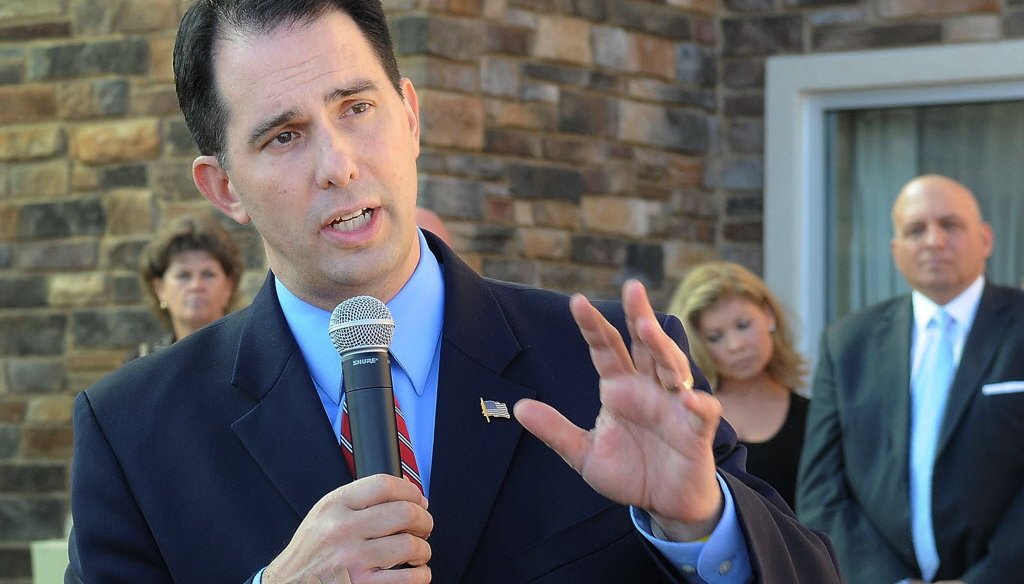Stand up for the facts!
Our only agenda is to publish the truth so you can be an informed participant in democracy.
We need your help.
I would like to contribute

Gov. Scott Walker's new book makes a number of statements that we've fact-checked before.
In his memoir due out Tuesday, Gov. Scott Walker recounts how he secretly crafted a plan "that gets rid of the unions and eliminates collective bargaining."
He dwells on the state of state government’s finances prior to his election and argues for how much better they are now.
And he takes a few pokes at President Obama’s Washington.
In the process, Walker makes some new claims but also touches on statements that, in one form or another, we’ve previously rated on the Truth-O-Meter.
Here’s a rundown of some of those claims from an advance copy of "Unintimidated: A Governor's Story and a Nation's Challenge."
Sign up for PolitiFact texts
Collective bargaining and unions
The most controversial legislation during Walker’s tenure has been Act 10, which took healthcare and pensions out of collective bargaining for most public employees. That allowed local governments and schools to impose cost-sharing for those benefits instead of negotiating with labor leaders.
Claim: "Without our reforms, property taxes would have risen by an average of $700 over the course of the biennium for the average taxpayer. Instead, thanks to Act 10, they declined on a median-valued home."
In July 2011, we rated False an abbreviated version of this claim when Walker said that "under our budget, the average property taxpayer will save $700." The figure was based on a flawed hypothetical scenario. The second part of the book’s claim, about taxes falling on a median home, is accurate. They went down $20 over Walker’s first two years.
Walker made a similar claim in October 2013, saying that a property tax relief bill meant taxpayers would save $680 over four years. We rated that Pants on Fire because the bill had nowhere near that impact and Walker used a hypothetical scenario to get his number while portraying it as real cash savings.
Claim: "My opponent in both the 2010 election and the 2012 recall, Milwaukee Mayor Tom Barrett, used our reforms to save his city millions of dollars."
Wisconsin Club for Growth, an anti-tax group, went even further when it claimed on a billboard that Barrett used the reforms to save Milwaukee $25 million. In January 2012, we rated the group’s claim Mostly True. We found the city expected a $25 million decrease in employee health costs, largely by having employees paying more for the benefit, but that $6 million was due to a switch the city made from an insured HMO to a self-funded approach. So, Act 10 did save the city millions.
Claim: "President Franklin Delano Roosevelt had once said that "the process of collective bargaining, as usually understood, cannot be transplanted in the public service.’"
We rated True a Walker claim in July 2013 that FDR "felt there wasn’t a need in the public sector to have collective bargaining because the government is the people." Like many elected officials of his time, FDR felt that public workers were represented by Congress, and that government bosses could not enter into negotiations with workers over pay.
Claim: Under collective bargaining rules in Milwaukee County, three county employees "were on full-time release for union business at a cost of over $170,000 in salary alone for these employees to participate only in union activities such as collective bargaining."
In May 2011, we rated a slightly different Walker claim True. For several decades, union contracts agreed upon by Milwaukee County provided for certain employees to be paid when they were doing union activities. The salaries for 2010 -- for three union presidents who did union work full-time and other employees who did occasional union work -- exceeded $180,000.
Claim: "Union bosses accused" state Supreme Court Justice David Prosser "of protecting a pedophile priest."
This is a reference to a TV ad run in March 2011 during a State supreme Court race by the Greater Wisconsin Committee, a liberal group that receives money from a variety of sources, including labor unions. The ad said that when Prosser was the Outagamie County district attorney, he didn’t investigate or file charges in a case involving a pedophile priest, then participated in a cover-up. We rated the claim Mostly False. The ad suggested more information was available to Prosser at the time than really was. For instance, Prosser didn’t know that the priest had a long history of molestation -- that came out 24 years later.
State, federal and county finances
Claim: "When I took office in January 2011, our state faced a massive $3.6 billion deficit."
Several weeks after Walker’s inauguration, then-state Rep. Mark Pocan (D-Madison) said the state’s budget deficit was "manufactured" and that Walker’s $3.6 billion estimate was "bogus." We rated the claim by Pocan, who now serves in Congress, False. We found that Walker was following the rules and traditions of projecting the difference between future tax collections and demands for government services for the 2011-’13 budget period.
Claim: "We were broke and just could not afford" a Milwaukee-to-Madison train
That’s the defense Walker gives in the book for refusing $810 million in federal money to build a high-speed rail line between the two cities.
We’ve rated two Walker claims that the state was broke. He earned a False for saying in February 2011, as he refused to negotiate over his plan to force state employees to pay more for health care and pensions: "We’re broke. We don’t have any more money." Employees and bills were being paid. Services were continuing to be performed. Revenue continued to roll in. And a variety of tools -- taxes, layoffs, spending cuts, debt shifting -- were available to make ends meet.
Seven months later, Walker got a Pants on Fire for saying in a fundraising letter that the state was broke and $3 billion in debt. Not only was Wisconsin not broke, but it was never $3 billion in debt. Rather, the state faced a $3.6 billion budget shortfall -- the difference between tax revenue projections and what agencies planned to spend in the next budget.
Claim: "The national debt is on track to double during Obama’s presidency."
This claim was a new one by the governor. We rated it Mostly True in November 2013, noting that documents from Obama’s own administration indicate the debt is on pace to double in raw dollars according to the way it is commonly reported. Obama bears part, but not all, of the blame.
Claim: "During my eight years as county executive, we cut the number of county workers by 20 percent."
True, we found in a November 2013 item. County parks, general administration, transportation and public works saw the deepest losses of staff on the county payroll, county records show.
Claim: "The $3.6 billion deficit we inherited has turned into more than a half-billion-dollar surplus."
We rated this Half True in November 2013. Walker cited accurate numbers, or very close, that show a turnaround from red to black in two years. The claim needs clarification because it mixes two different ways to define the size of the turnaround. Still, even when viewed with apples to apples, the turnaround looks close to what he described.
Claim: "Gov. Doyle rammed a budget repair bill that raised taxes by more than a billion dollars through both houses in 24 hours -- without a public hearing."
Walker is correct that his predecessor, Democrat Jim Doyle, pushed through the bill with no public hearing, and there’s a strong case that the tax hike exceeded a billion dollars. Both houses voted one day after introduction of the bill. We researched a similar claim by then-state Rep. Jeff Fitzgerald in November 2010. Fitzgerald way overstated the size of the tax hike, earning him a Mostly False.
Claim: Wisconsin’s pension system "is the only pension system in the country that is essentially fully funded."
True, we said in a January 2013 item. Walker said it during an address at the Reagan Presidential Library, contrasting Wisconsin to Illinois, whose pension fund Walker said was not even halfway funded.
Miscellaneous
Claim: "In 2009, before I took office, a survey by the statewide chamber of commerce found that just 4% of the employers in Wisconsin thought the state was headed in the right direction. Today, 94% of those employers said Wisconsin is heading in the right direction."
We rated it Half True when Walker made this claim in February 2012. He added then that a majority of Wisconsin employers say they are going to grow their companies in 2012. The numbers are true as far as they go, but the survey was small and oversampled large employers and manufacturers compared to the overall statewide employer profile, so it didn’t necessarily reflect statewide beliefs.
Claim: "One of the protesters even targeted Matt and Alex on Facebook."
Here’s a case in which Walker, in the book, altered a statement he had made previously. His statement in March 2012 was that "out-of-state protesters" targeted his two teen sons, Matt and Alex, on Facebook. We rated that Half True. One Wisconsin protester posted two messages critical of the governor on Facebook, then linked them to Matt’s and Alex’s Facebook pages.
To comment on this article, please go to JSOnline.com.
We always appreciate suggestions on statements made by politicians or groups that we should consider fact checking. If you come across one, whether it’s in Walker’s new book or anywhere else, please let us know (and include a link, if you can):
PolitiFact@journalsentinel.com
facebook.com/politifact.wisconsin
@PolitiFactWisc
Our Sources
PolitiFact Wisconsin Truth-O-Meter items, as noted






























